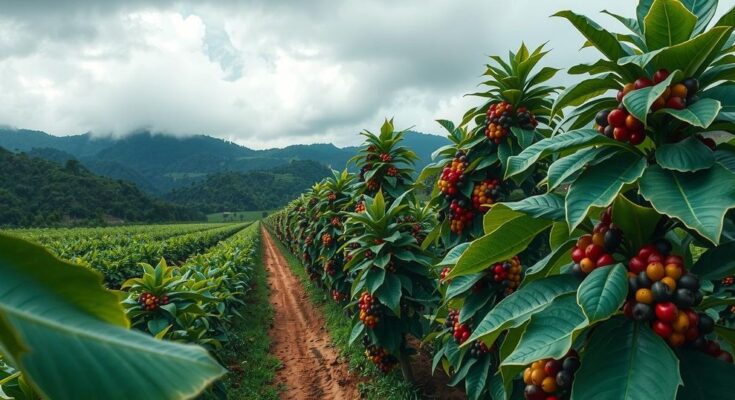The global coffee market is challenged by Brazil’s dry weather and strengthened currency, risking reduced crop yields, particularly in arabica production. Currency appreciation is lessening Brazilian coffee’s competitive pricing, while robusta inventories have increased, causing price pressures. Adverse weather in Vietnam poses additional supply risks. The uncertainty in these key regions could sustain coffee prices as the industry confronts climate-related challenges.
The global coffee market is currently facing significant challenges due to climatic and economic factors, particularly in Brazil, a major coffee producer. Persistent dry conditions and a strengthening currency are raising concerns about crop yields, leading to uncertainty among traders and consumers. Brazil’s Minas Gerais region, essential for coffee cultivation, is suffering from inadequate rainfall, threatening the future of arabica bean production, which is highly sensitive to such weather conditions.
Furthermore, the Brazilian real’s robust performance against the dollar has made Brazilian coffee less competitively priced in the global market. This currency appreciation may lead to a decrease in export volumes, thereby exacerbating supply constraints and contributing to volatility in coffee pricing. While arabica beans witness upward price pressure, robusta beans are experiencing a contrasting situation, with increased inventories leading to price reductions.
Yet, this apparent oversupply belies serious concerns regarding long-term supply stability due to dwindling export figures from major producing regions. Predictions of reduced Brazilian crop yields for the upcoming season, prompted by ongoing dry weather and the residual impacts of El Niño, are raising alarm bells within the market. Such climatic challenges are not isolated to Brazil but extend to coffee production throughout South and Central America.
In the robusta sector, Vietnam, a leading producer, is also experiencing a significant drop in output due to adverse weather, further raising global supply concerns. Although increased exports from other regions may help balance the market, analysts predict potential deficits in arabica supply. They emphasize the growing impact of climate change on coffee farming.
As a result, accurate forecasting and strategic planning are paramount for the coffee industry, which faces heightened volatility. Despite bearish trends in specific market segments, overarching supply constraints and uncertainties due to climatic conditions dominate the landscape. The outcomes in Brazil and Vietnam will be particularly influential in determining global supply dynamics and coffee prices in the near future.
In conclusion, the global coffee market is at a critical juncture, influenced heavily by Brazil’s dry conditions and the appreciation of its currency. The implications for arabica bean production are particularly concerning as they threaten supply stability. Concurrently, the robusta market faces its own challenges with Vietnam’s production downturn. As the coffee industry navigates these complexities, the need for effective forecasting and strategic approaches to mitigate the impact of climate change remains essential.
Original Source: www.chemanalyst.com




